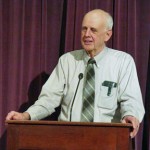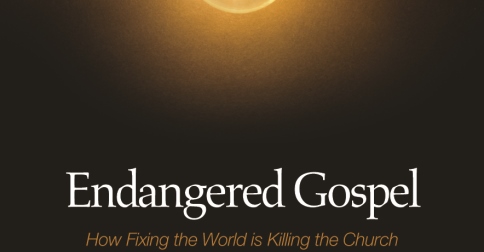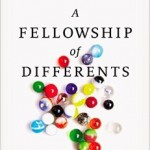 [ On July 5-7, The Ekklesia Project will hold its annual gathering in Chicago, which will be on the theme of Slow Church. Between now and July, we will be running a series of lguest reflections here by folks connected with the E.P. We’ve asked guest posters to reflect on the meaning of Slow Church from their own local contexts. More info on the E.P. gathering. ]
[ On July 5-7, The Ekklesia Project will hold its annual gathering in Chicago, which will be on the theme of Slow Church. Between now and July, we will be running a series of lguest reflections here by folks connected with the E.P. We’ve asked guest posters to reflect on the meaning of Slow Church from their own local contexts. More info on the E.P. gathering. ]
Today’s reflection, the fifth in the series, is by Ted Lewis.
Read the previous post in the series by Susan Adams.
Over the past two years I’ve been part of a small men’s group in my church, and one thing has been clear to me: all of our journeys of formation are moving along very slowly. We also talk about issues of congregational formation, and we usually see this growth as going at a snail’s pace. In both cases, it appears that Resistance Factors outweigh Growth Factors for new formation.
Biblically speaking, I guess we are in good company. Old Testament narratives about the Israelites highlight their chronic resistance to repentance, and Gospel narratives emphasize how the disciples just didn’t get what Jesus was saying. “Let these words sink into your ears,” Jesus said when forecasting his betrayal and suffering (Luke 9:44). “But (the disciples) did not understand… and were afraid to ask him.” It’s almost as if a part of us doesn’t want to understand, because if we really did ‘get it’, we would have to change. In a similar situation, Jesus called two disciples “slow of heart” for not comprehending the significance of a messiah who had to suffer (Luke 24).
In this biblical light, slowness is hardly a virtue to be sought. This slow-to-learn, slow-to-turn character trait seems to match up with the fool of Proverbs who never sees the need for growth, building up default-level defenses to resist change. How then do we move from this negative connotation of slowness in our personal and congregational formations toward a positive notion of slowness that supports a Slow Church in today’s fast-paced world?
A verse to help us make this pivot is found at the mid-point of Hebrews. The writer has just warned those who do not advance from ‘milk’ to ‘meat’, but then assured the readers that God will not overlook their love shown through service to the saints.
“And we want each one of you to show the same diligence so as to realize the full assurance of hope to the very end, so that you may not become sluggish, but imitators of those who through faith and patience inherit the promises” (Hebrews 6:11,12).
We have here a nice transition from sluggishness to patience. We move from that which slows down our formation to that which sustains our slow, steady formation. The irony is that true formation is slow for two opposing yet intertwined reasons: it is slow because deep down we do not want to change, and it is also slow because deep change can only happen over long stretches of time. In the first case, we contribute to the retardation of our formation; in the second case we advance our formation by our long-term participation in it. These two themes weave throughout the book of Hebrews.
Returning to our verse, it’s worth noting how patience works within a community and also within a timeframe. Some folks are worthy of our imitation because they are already eating ‘meat’. They are transforming the tough, fibrous stuff of life through cruciform activity, and the writer wants “each one” to reach the same level of diligence in serving others no matter how hard the times are. This can involve a double-patience: patience in a brother’s or sister’s formation, and patience in one’s own formation. One way to think about patience is that one relinquishes a need to control things while adopting a more trusting, hopeful viewpoint.
Little wonder that the literal translation for patience (from Greek macro-thumia) is “long-suffering.” But what’s good about long-suffering, or, could we say, slow-suffering? The good thing is that longer, slower suffering, when faced with eyes of faith and ecclesial support, yields a harvest of character growth that bonds us closer to God and to each other. As Paul said in Romans 5, suffering met with endurance leads to character, and the final fruit is hope. And hope, in the company of the word ‘slow’, is defined by time. Hope is something we gain over time, like regained trust in a teenager who broke trust. Hope is a reality during steady, long-term formation. We “realize the assurance of hope” not at the end, but significantly “to the end.”
So much in our society makes us want to speed up our formation journeys. Book titles like The Seven Secrets of Life make us think we can experience a final breakthrough in a few months. When we can’t focus well on the slow pace of our own formation that can redeem our past wounds into growth, we tend to get impatient about the lack of growth in others, or even in whole congregations. Again, patience is the key element in slow formation precisely because it takes time for hard things in our past to be transformed into substantial, weighty glory. It is slow because it can’t be quick. This inward glory-forging is a “day by day” affair (2 Cor. 4).
In my mediation and restorative justice work, I often sit with people who want to get beyond old hurts with others, but when the opportunity for joint dialogue arises, some choose to not go forward. They usually have strong cognitive justifications for not wanting any change, and like the characters in The Great Divorce, they know it is too costly to release the Old and embrace the New. But sometimes I stay with these people for longer stretches of time, supporting and validating their experiences, and helping them imagine a new future. Sometimes this support allows them to move forward and ultimately find peace of mind.
Here is where congregational formation is vital for individual formation. If caring supports, imitation-modelers, and an ethos of patience are all present, this trio creates a church culture where members can more easily let go of their inner resistance to formation, and become more vulnerable to participate in cruciform activities. This, in turn, means personal growth in the very context of serving others. Under girding this culture, of course, is the same trio within divine revelation: God’s care, God’s modeling, and God’s patience. And if churches go slow enough for all the right reasons, overcoming sluggishness, resurrection miracles will make the Body glow.
——-
Ted Lewis is the Executive Director for Barron County Restorative Justice Programs in Rice Lake, Wisconsin, and he attends the United Presbyterian Church in Rice Lake.
[ Photo credit – Wikimedia Commons ]












